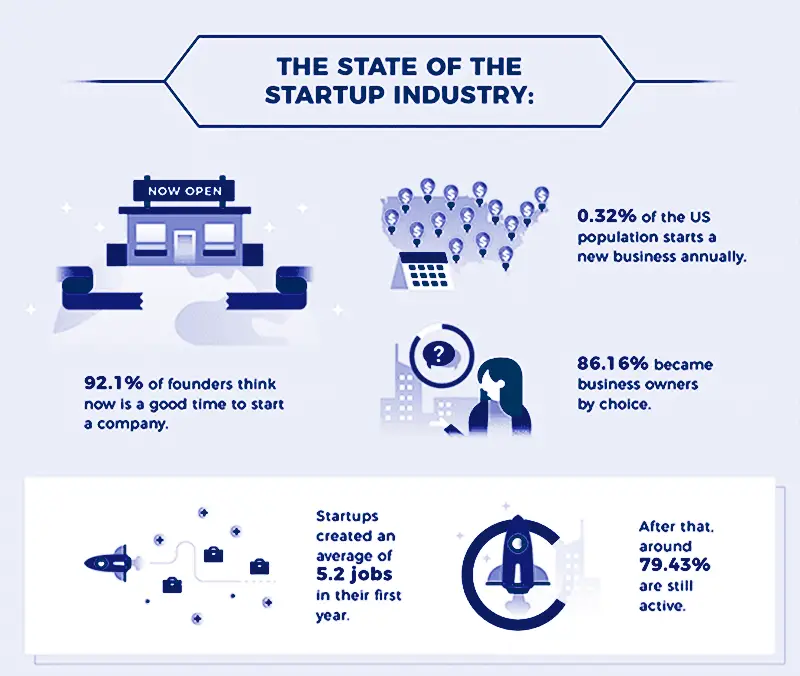
Do you know the Top 3 Challenges Facing Startups Today 2023? The startup industry has grown exponentially over the past few years, with more and more entrepreneurs venturing into the business world with innovative ideas and unique solutions. However, the road to success is never easy, and startups face a plethora of challenges that can hinder their growth and sustainability. In 2023, the industry is poised to face a new set of challenges that will test the resilience and adaptability of startups. In this blog post, we will explore the top 3 challenges that startups are likely to face in 2023, along with potential solutions and strategies to overcome them.
Read More: Slow Computer Startup: 14 Best Ways to Fix
The State of the Startup Industry in 2023

The startup industry is set to continue its rapid growth in 2023, fueled by technological advancements and a favorable investment climate. However, the industry is also likely to face increased competition, as more and more players enter the market. The rise of digital platforms and the increasing popularity of e-commerce are also expected to shape the industry in the coming years. Startups will need to be agile and adaptable to stay ahead of the curve and succeed in this dynamic landscape.
Top 3 Challenges Facing Startups in 2023
Funding: Securing adequate funding is one of the biggest challenges that startups face, and this is likely to continue in 2023. Investors are becoming increasingly cautious and selective, and startups will need to demonstrate a solid business plan and clear revenue streams to secure funding.
Talent Acquisition and Retention: In a highly competitive market, attracting and retaining top talent is crucial for the success of startups. However, the talent pool is limited, and startups may struggle to compete with larger, more established companies for the best candidates.
Market Competition: With the rise of digital platforms and the increasing popularity of e-commerce, startups are likely to face stiff competition in 2023. Established players have the advantage of brand recognition and a loyal customer base, making it challenging for startups to gain a foothold in the market.
In-Depth Exploration of Each Challenge and Its Impact on Startups

Challenge 1: Funding
Securing funding is essential for startups to develop their products and services, expand their operations, and attract top talent. However, startups face a range of challenges when it comes to funding, including a lack of access to capital, a high failure rate, and an increasingly cautious investor market. The impact of these challenges can be devastating, with startups struggling to survive or unable to scale their operations. To overcome this challenge, startups need to develop a solid business plan and revenue streams, seek alternative funding sources such as crowdfunding, and build relationships with investors over time.
Talent Acquisition and Retention
The success of startups hinges on the quality of their team, and attracting and retaining top talent is crucial. However, startups may struggle to compete with larger, more established companies that offer more comprehensive benefits and opportunities for growth. This can lead to high turnover rates and a lack of stability within the company. To overcome this challenge, startups need to create a strong company culture, offer competitive compensation and benefits, provide opportunities for growth and development, and establish a reputation as an employer of choice.
Challenge 3: Market Competition
The rise of digital platforms and the increasing popularity of e-commerce are creating a highly competitive market, making it challenging for startups to gain a foothold. Established players have the advantage of brand recognition and a loyal customer base, making it difficult for startups to differentiate themselves and stand out in the market. To overcome this challenge, startups need to develop a unique value proposition, create a strong brand identity, and focus on providing exceptional customer service and user experience.
Future Trends and Opportunities for Startups in 2023

Despite the challenges facing startups in 2023, there are also many opportunities for growth and success. Here are some of the key trends and opportunities that startups should keep in mind:
Digital Transformation: The COVID-19 pandemic has accelerated the shift towards digital platforms and e-commerce, creating new opportunities for startups to develop innovative solutions in this space. Startups that can leverage the latest technologies, such as artificial intelligence and machine learning, to create new products and services will have a competitive advantage.
Sustainability: With increasing awareness about climate change and environmental issues, there is growing demand for sustainable products and services. Startups that can offer eco-friendly alternatives and promote sustainability in their operations will be well-positioned for success.
Remote Work: The pandemic has also highlighted the benefits of remote work, and many companies are likely to adopt a hybrid or fully remote work model in the future. Startups that can offer remote work solutions, such as virtual collaboration tools and productivity software, will be in high demand.
Healthcare Innovation: The healthcare industry is ripe for disruption, and startups that can develop innovative solutions in this space, such as telemedicine and personalized medicine, will have significant growth opportunities.
Diversity and Inclusion: With increasing attention on diversity and inclusion, startups that can create a diverse and inclusive work environment and develop products and services that cater to underrepresented communities will have a competitive advantage.
Conclusion and Key Takeaways
In conclusion, startups in 2023 will face a range of challenges, from securing funding to competing in a highly dynamic market. However, there are also many opportunities for growth and success, particularly in the areas of digital transformation, sustainability, remote work, healthcare innovation, and diversity and inclusion. To succeed in this landscape, startups will need to be agile, adaptable, and innovative, and focus on creating a strong brand identity, providing exceptional customer service, and attracting and retaining top talent. By overcoming these challenges and capitalizing on these opportunities, startups can achieve sustainable growth and long-term success.
Read More: New Dating App Startups are Being Driven by Video
FAQ:
What are the top challenges facing startups in 2023?
The top challenges facing startups in 2023 are funding, talent acquisition and retention, and market competition.
Funding: Startups face significant challenges in securing funding, particularly in the early stages of their development. Investors are becoming increasingly selective in their investment decisions, and startups must be able to demonstrate a strong business case, a clear path to profitability, and a well-defined market opportunity. Startups may also need to explore alternative funding sources, such as crowdfunding, grants, or government programs.
Talent Acquisition and Retention: Hiring and retaining top talent is critical to the success of any startup, but it can be a significant challenge. Startups may struggle to compete with larger, more established companies for the best talent, and may also face high turnover rates. To address these challenges, startups need to create a strong company culture, provide competitive compensation and benefits, and offer opportunities for growth and development.
Market Competition: Startups face intense competition from both established companies and other startups in their industry. Startups must be able to differentiate themselves from their competitors by offering a unique value proposition, creating a strong brand identity, and providing exceptional customer service. Startups must also be able to adapt quickly to changing market conditions and customer needs.
What are the future trends and opportunities for startups in 2023?
Future trends and opportunities for startups in 2023 include digital transformation, sustainability, remote work, healthcare innovation, and diversity and inclusion.
Digital Transformation: The COVID-19 pandemic has accelerated the shift towards digital platforms and e-commerce, creating new opportunities for startups to develop innovative solutions in this space. Startups that can leverage the latest technologies, such as artificial intelligence and machine learning, to create new products and services will have a competitive advantage.
Sustainability: With increasing awareness about climate change and environmental issues, there is growing demand for sustainable products and services. Startups that can offer eco-friendly alternatives and promote sustainability in their operations will be well-positioned for success.
Remote Work: The pandemic has also highlighted the benefits of remote work, and many companies are likely to adopt a hybrid or fully remote work model in the future. Startups that can offer remote work solutions, such as virtual collaboration tools and productivity software, will be in high demand.
Healthcare Innovation: The healthcare industry is ripe for disruption, and startups that can develop innovative solutions in this space, such as telemedicine and personalized medicine, will have significant growth opportunities.
Diversity and Inclusion: With increasing attention on diversity and inclusion, startups that can create a diverse and inclusive work environment and develop products and services that cater to underrepresented communities will have a competitive advantage.











